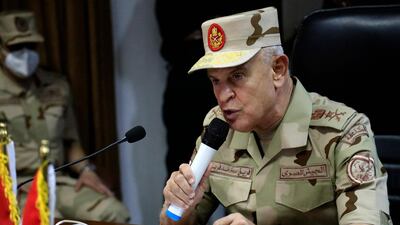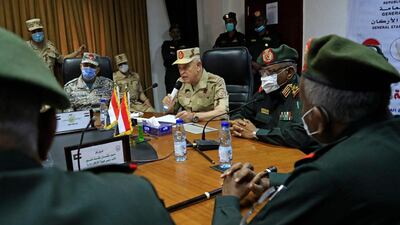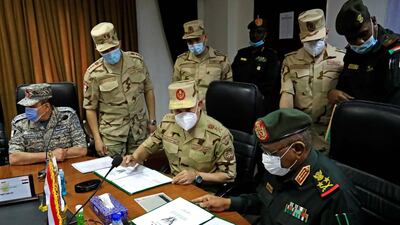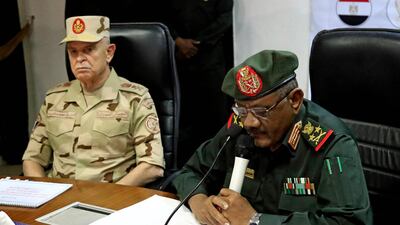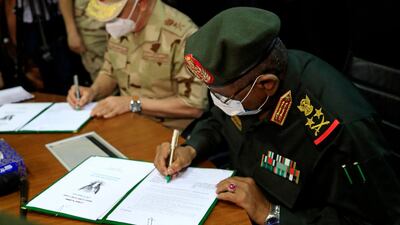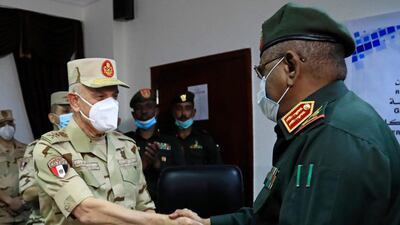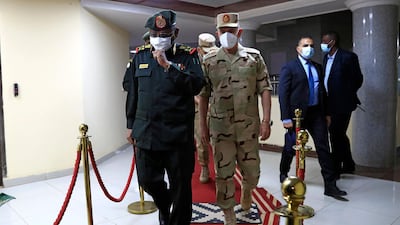Egypt and Sudan on Tuesday signed a defence co-operation pact, sending Ethiopia a stern warning over what the two allies see as its intransigence on a border dispute with Khartoum and talks over Addis Ababa’s construction of a massive Nile dam.
Signed in Khartoum by the Sudanese and Egyptian chiefs of staff, the pact crowns months of increasingly closer relations between the militaries of the two countries, including a series of joint war games and high-level visits.
It came as Sudan’s Foreign Minister Mariam Al Mahdi met with her Egyptian counterpart in Cairo on Tuesday, when the pair blamed Ethiopia for stalled talks on the dam project and urged bringing in international parties into the talks to make progress.
Ms Al Sadeq, who met President Abdel Fatah El Sisi earlier on Tuesday, said the Egyptian pleader planned to visit Sudan “within days.” She gave no details.
Cairo’s backing for Sudan should come as boon for the Sudanese military, which has been involved in a series of increasingly provocative tit-for-tat incidents on the border with Ethiopia.
“We thank our brothers from the Egyptian armed forces for their good intentions, generous assistance and their strong support to overcome the present difficulties,” Sudan’s chief of staff, General Mohamed Othman Al Hussein, told the signing ceremony.
Also speaking at the ceremony, his Egyptian counterpart, General Mohammed Farid Hegazy, said little of the content of the joint defence pact but spoke at length about military and security co-operation between the two countries, including intelligence gathering and of the overlap of their national security.
He also reassured the Sudanese in crystal clear language that Egypt would not hesitate to quickly come to Sudan’s aid if needed.
“The resources, strong will and resolve are there to implement what we have agreed on to counter any emergency situations,” he said. “Egypt is ready to meet Sudan’s requests in all fields, including armament, joint training, technical support and securing joint borders,” he added, citing what he called the “gravity of dangers surrounding us.”
The comments by the two generals appear to go beyond rhetoric given the gravity and intractableness of the Sudan-Ethiopia border dispute and the quarrel over the Grand Ethiopian Renaissance Dam, or GERD.
At the talks in Cairo, Ms Al Mahdi and Sameh Shoukry, her Egyptian counterpart, urged more outside involvement in the GERD talks.
The pair urged the UN, EU and US to form a framework with the African Union chair – currently the Democratic Republic of Congo – to help restart and mediate the talks as a quartet.
The pair also described Addis Ababa’s unilateral decision to move forward with a second phase of filling the Renaissance Dam as a clear violation of earlier agreements
The Sudanese-Ethiopian border dispute has seen forces from both sides engage in several deadly clashes after the Sudanese military moved late last year to wrest back control of farmlands settled by members of Ethiopia’s Amhara ethnic group since the 1950s.
The two countries have since engaged in sabre rattling, accusing each other of border incursions, targeting civilians and massing up troops on the border.
Ethiopia has also claimed the Sudanese military was stoking the dispute for the benefit of Egypt, also at sharp odds with Addis Ababa over the likelihood that the GERD would deeply cut its vital share of the Nile waters.
Sudan has maintained that Ethiopia’s failure to share data on the operation of the dam, located less than 20 kilometres from the border, puts at risk the lives of 20 million Sudanese. It worries about deadly flooding and the possibility the dam could disrupt the work of its smaller power-generating dams on the Blue Nile.
Egypt has said the dam presents an existential issue and it would not stand idly by if Ethiopia tries to impose a de facto situation.
Ethiopia was expected to make good on its often-repeated threat to go ahead with a second filling of the dam in July, regardless of whether an agreement was reached with downstream Egypt and Sudan on the operation of the GERD.
The filling, involving about 13 billion cubic meters of water, could significantly set back efforts to find a peaceful resolution to the GERD dispute, handing Addis Ababa an unassailably strong position in future negotiations and again raising the prospect of a war that could destabilise the entire region.
While Sudan shares a border with Ethiopia, Egypt does not, a fact that would dictate the nature of any military involvement by the Egyptians in a future conflict.
But President El Sisi has been procuring billions of dollars’ worth of cutting-edge weapons over the past six years, some of which give his military the capability of operating beyond its borders.
A general-turned-president, Mr El Sisi has said that negotiations was the preferred method of resolving the dispute over the dam, but he never categorically ruled out military action.
The Grand Ethiopian Renaissance Dam - in pictures
UAE currency: the story behind the money in your pockets
The specs
Engine: 8.0-litre, quad-turbo 16-cylinder
Transmission: 7-speed auto
0-100kmh 2.3 seconds
0-200kmh 5.5 seconds
0-300kmh 11.6 seconds
Power: 1500hp
Torque: 1600Nm
Price: Dh13,400,000
On sale: now
Petrarch: Everywhere a Wanderer
Christopher Celenza,
Reaktion Books
COMPANY%20PROFILE
%3Cp%3E%3Cstrong%3ECompany%3A%20%3C%2Fstrong%3EGrowdash%0D%3Cbr%3E%3Cstrong%3EStarted%3A%20%3C%2Fstrong%3EJuly%202022%0D%3Cbr%3E%3Cstrong%3EFounders%3A%20%3C%2Fstrong%3ESean%20Trevaskis%20and%20Enver%20Sorkun%0D%3Cbr%3E%3Cstrong%3EBased%3A%20%3C%2Fstrong%3EDubai%2C%20UAE%0D%3Cbr%3E%3Cstrong%3EIndustry%3A%20%3C%2Fstrong%3ERestaurant%20technology%0D%3Cbr%3E%3Cstrong%3EFunding%20so%20far%3A%3C%2Fstrong%3E%20%24750%2C000%0D%3Cbr%3E%3Cstrong%3EInvestors%3A%20%3C%2Fstrong%3EFlat6Labs%2C%20Plus%20VC%2C%20Judah%20VC%2C%20TPN%20Investments%20and%20angel%20investors%2C%20including%20former%20Talabat%20chief%20executive%20Abdulhamid%20Alomar%2C%20and%20entrepreneur%20Zeid%20Husban%3C%2Fp%3E%0A
Chef Nobu's advice for eating sushi
“One mistake people always make is adding extra wasabi. There is no need for this, because it should already be there between the rice and the fish.
“When eating nigiri, you must dip the fish – not the rice – in soy sauce, otherwise the rice will collapse. Also, don’t use too much soy sauce or it will make you thirsty. For sushi rolls, dip a little of the rice-covered roll lightly in soy sauce and eat in one bite.
“Chopsticks are acceptable, but really, I recommend using your fingers for sushi. Do use chopsticks for sashimi, though.
“The ginger should be eaten separately as a palette cleanser and used to clear the mouth when switching between different pieces of fish.”
Key facilities
- Olympic-size swimming pool with a split bulkhead for multi-use configurations, including water polo and 50m/25m training lanes
- Premier League-standard football pitch
- 400m Olympic running track
- NBA-spec basketball court with auditorium
- 600-seat auditorium
- Spaces for historical and cultural exploration
- An elevated football field that doubles as a helipad
- Specialist robotics and science laboratories
- AR and VR-enabled learning centres
- Disruption Lab and Research Centre for developing entrepreneurial skills
The%20trailblazers
%3Cp%3ESixteen%20boys%20and%2015%20girls%20have%20gone%20on%20from%20Go-Pro%20Academy%20in%20Dubai%20to%20either%20professional%20contracts%20abroad%20or%20scholarships%20in%20the%20United%20States.%20Here%20are%20two%20of%20the%20most%20prominent.%0D%3C%2Fp%3E%0A%3Cp%3E%3Cstrong%3EGeorgia%20Gibson%20(Newcastle%20United)%3C%2Fstrong%3E%0D%3Cbr%3EThe%20reason%20the%20academy%20in%20Dubai%20first%20set%20up%20a%20girls%E2%80%99%20programme%20was%20to%20help%20Gibson%20reach%20her%20potential.%20Now%20she%20plays%20professionally%20for%20Newcastle%20United%20in%20the%20UK.%0D%3C%2Fp%3E%0A%3Cp%3E%3Cstrong%3EMackenzie%20Hunt%20(Everton)%3C%2Fstrong%3E%0D%3Cbr%3EAttended%20DESS%20in%20Dubai%2C%20before%20heading%20to%20the%20UK%20to%20join%20Everton%20full%20time%20as%20a%20teenager.%20He%20was%20on%20the%20bench%20for%20the%20first%20team%20as%20recently%20as%20their%20fixture%20against%20Brighton%20on%20February%2024.%0D%3C%2Fp%3E%0A
White hydrogen: Naturally occurring hydrogen
Chromite: Hard, metallic mineral containing iron oxide and chromium oxide
Ultramafic rocks: Dark-coloured rocks rich in magnesium or iron with very low silica content
Ophiolite: A section of the earth’s crust, which is oceanic in nature that has since been uplifted and exposed on land
Olivine: A commonly occurring magnesium iron silicate mineral that derives its name for its olive-green yellow-green colour
Polarised public
31% in UK say BBC is biased to left-wing views
19% in UK say BBC is biased to right-wing views
19% in UK say BBC is not biased at all
Source: YouGov
What can victims do?
Always use only regulated platforms
Stop all transactions and communication on suspicion
Save all evidence (screenshots, chat logs, transaction IDs)
Report to local authorities
Warn others to prevent further harm
Courtesy: Crystal Intelligence
The biog
Nickname: Mama Nadia to children, staff and parents
Education: Bachelors degree in English Literature with Social work from UAE University
As a child: Kept sweets on the window sill for workers, set aside money to pay for education of needy families
Holidays: Spends most of her days off at Senses often with her family who describe the centre as part of their life too
The Travel Diaries of Albert Einstein The Far East, Palestine, and Spain, 1922 – 1923
Editor Ze’ev Rosenkranz
Princeton
Key figures in the life of the fort
Sheikh Dhiyab bin Isa (ruled 1761-1793) Built Qasr Al Hosn as a watchtower to guard over the only freshwater well on Abu Dhabi island.
Sheikh Shakhbut bin Dhiyab (ruled 1793-1816) Expanded the tower into a small fort and transferred his ruling place of residence from Liwa Oasis to the fort on the island.
Sheikh Tahnoon bin Shakhbut (ruled 1818-1833) Expanded Qasr Al Hosn further as Abu Dhabi grew from a small village of palm huts to a town of more than 5,000 inhabitants.
Sheikh Khalifa bin Shakhbut (ruled 1833-1845) Repaired and fortified the fort.
Sheikh Saeed bin Tahnoon (ruled 1845-1855) Turned Qasr Al Hosn into a strong two-storied structure.
Sheikh Zayed bin Khalifa (ruled 1855-1909) Expanded Qasr Al Hosn further to reflect the emirate's increasing prominence.
Sheikh Shakhbut bin Sultan (ruled 1928-1966) Renovated and enlarged Qasr Al Hosn, adding a decorative arch and two new villas.
Sheikh Zayed bin Sultan (ruled 1966-2004) Moved the royal residence to Al Manhal palace and kept his diwan at Qasr Al Hosn.
Sources: Jayanti Maitra, www.adach.ae
More from Neighbourhood Watch:
Spec%20sheet
%3Cp%3E%3Cstrong%3EDisplay%3A%3C%2Fstrong%3E%204.7%22%20Retina%20HD%2C%201334%20x%20750%2C%20625%20nits%2C%201400%3A1%2C%20True%20Tone%2C%20P3%3Cbr%3E%3Cstrong%3EChip%3A%3C%2Fstrong%3E%20Apple%20A15%20Bionic%2C%206-core%20CPU%2C%204-core%20GPU%2C%2016-core%20Neural%20Engine%3Cbr%3E%3Cstrong%3ECamera%3A%3C%2Fstrong%3E%2012MP%2C%20f%2F1.8%2C%205x%20digital%20zoom%2C%20Smart%20HDR%2C%20Deep%20Fusion%3Cbr%3E%3Cstrong%3EVideo%3A%3C%2Fstrong%3E%204K%2B%40%2024%2F30%2F60fps%2C%20full%20HD%2B%40%2030%2F60fps%2C%20HD%2B%40%2030%20fps%3Cstrong%3E%3Cbr%3EFront%20camera%3A%20%3C%2Fstrong%3E7MP%2C%20f%2F2.2%2C%20Smart%20HDR%2C%20Deep%20Fusion%3B%20HD%20video%2B%40%2030fps%3Cbr%3E%3Cstrong%3EBattery%3A%3C%2Fstrong%3E%20Up%20to%2015%20hours%20video%2C%2050%20hours%20audio%3B%2050%25%20fast%20charge%20in%2030%20minutes%20with%2020W%20charger%3B%20wireless%20charging%3Cbr%3E%3Cstrong%3EBiometrics%3A%3C%2Fstrong%3E%20Touch%20ID%3Cbr%3E%3Cstrong%3EDurability%3A%3C%2Fstrong%3E%20IP67%2C%20dust%2C%20water%20resistant%20up%20to%201m%20for%2030%20minutes%3Cbr%3E%3Cstrong%3EPrice%3A%3C%2Fstrong%3E%20From%20Dh1%2C849%3C%2Fp%3E%0A
Our legal consultant
Name: Hassan Mohsen Elhais
Position: legal consultant with Al Rowaad Advocates and Legal Consultants.
Terror attacks in Paris, November 13, 2015
- At 9.16pm, three suicide attackers killed one person outside the Atade de France during a foootball match between France and Germany
- At 9.25pm, three attackers opened fire on restaurants and cafes over 20 minutes, killing 39 people
- Shortly after 9.40pm, three other attackers launched a three-hour raid on the Bataclan, in which 1,500 people had gathered to watch a rock concert. In total, 90 people were killed
- Salah Abdeslam, the only survivor of the terrorists, did not directly participate in the attacks, thought to be due to a technical glitch in his suicide vest
- He fled to Belgium and was involved in attacks on Brussels in March 2016. He is serving a life sentence in France
